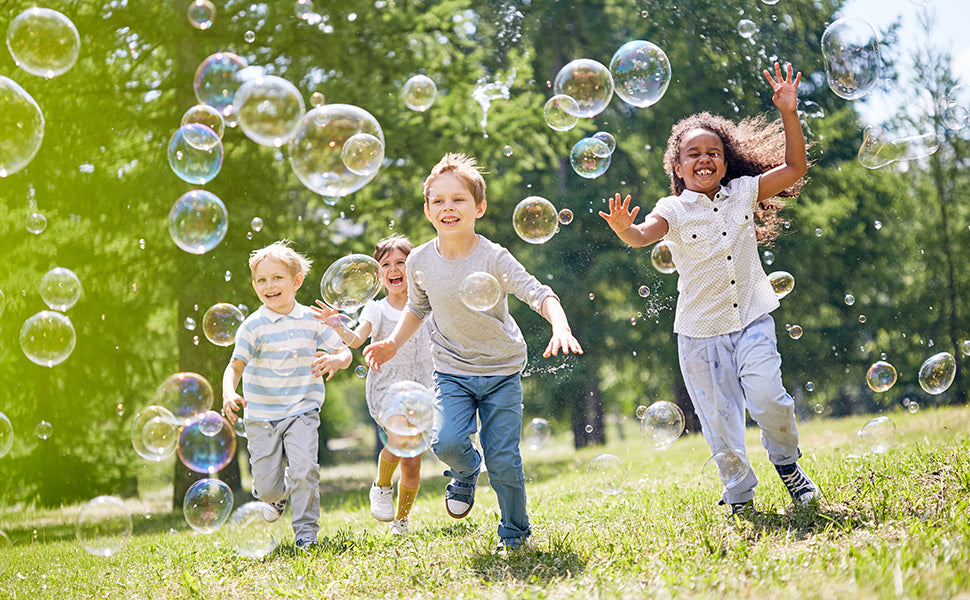The Crucial Role of Outdoor Play in Fostering Holistic Child Development
In today's increasingly digitised world, where screens and structured activities dominate children's lives, the significance of outdoor play cannot be overstated. Outdoor play is more than just a recreational pastime; it is a vital component of a child's physical, cognitive, social, and emotional development. This comprehensive article will delve deeper into the multifaceted advantages of outdoor play for children, including physical fitness, cognitive growth, social interaction, and a profound connection with nature.
Physical Fitness: Nurturing Healthy Bodies
Outdoor play is synonymous with physical activity. Whether it's climbing trees, riding bicycles, or simply running around in the fresh air, these activities are essential for a child's physical fitness. Engaging in outdoor play helps children develop strong bones and muscles, improve coordination, and enhance balance. Moreover, it provides an opportunity for children to expend energy, reducing the risk of childhood obesity. The benefits of these activities extend well into adulthood, promoting lifelong habits of physical well-being.
Creative Experiences: Unleashing Imagination
Outdoor environments offer an expansive canvas for creative play activities. The great outdoors is a boundless source of inspiration, encouraging children to use their imaginations to the fullest. Whether they are building elaborate forts using fallen branches, creating intricate artwork with leaves and rocks, or embarking on nature-based treasure hunts, these creative experiences stimulate cognitive development. They encourage problem-solving skills, foster the ability to think outside the box and inspire a lifelong love of artistic expression.
Cognitive Growth: Nature as the Ultimate Teacher
Nature is a captivating teacher, offering countless opportunities for exploration and learning. Outdoor play nurtures curiosity and a sense of wonder in children. It encourages them to observe and interact with the natural world, leading to a deeper understanding of science, ecology, and the environment. Numerous studies have shown that exposure to nature enhances cognitive development, including improved attention span, memory, and academic performance. Outdoor play, therefore, serves as a foundation for a child's lifelong learning journey.
Social Skills: Nurturing Relationships
Outdoor play often involves interaction with peers, laying the groundwork for the development of crucial social skills. Whether it's negotiating the rules of a game, cooperating in a group activity, or resolving conflicts during play, children learn valuable lessons about communication and teamwork. These social interactions help build self-confidence and emotional intelligence, skills that are essential for successful relationships in adulthood. In essence, outdoor play is a social laboratory where children learn to navigate the complexities of human interaction.
Cooperative Play: Learning Together
One of the most valuable aspects of outdoor play is the opportunity for cooperative play. Building a sandcastle with friends, working together on a nature-themed project, or participating in team sports teaches children the importance of collaboration and compromise. These experiences are the building blocks of future social and professional relationships. Cooperative play fosters a sense of belonging and teaches children how to contribute positively to a group, an essential skill that extends beyond the playground.
Fine Motor Skills: Precision and Control
Beyond gross motor skills, outdoor play also aids in the development of fine motor skills. Activities such as picking up small objects, drawing with chalk, or threading beads onto a string enhance hand-eye coordination and dexterity. These skills are essential for daily tasks such as writing, tying shoelaces, and using utensils. By engaging in outdoor activities requiring precision and control, children are better prepared for the challenges they encounter in the classroom and beyond.
A Deeper Connection with Nature: Fostering Environmental Stewardship
Perhaps one of the most profound benefits of outdoor play is the development of a deep and lasting connection with the natural world. Spending time outdoors allows children to appreciate the beauty and intricacies of nature, fostering a sense of responsibility for its preservation. This connection can lead to a lifelong appreciation for the environment and a desire to protect it. In an era where environmental challenges are pressing, nurturing this connection with nature through outdoor play is an investment in a sustainable future.
Conclusion
Outdoor play is not merely a recreational activity but a fundamental aspect of holistic child development. The benefits are diverse and far-reaching from physical fitness and cognitive growth to social skills and a profound connection with nature. As parents, caregivers, and educators, we are responsible for ensuring that children have ample opportunities to explore the great outdoors and reap the rewards of play in its purest form.
If you are looking for products that encourage outdoor play and exploration, consider the TP Toys Bug Hotel and TP Wooden Deluxe Potting Bench, designed to inspire children's creativity and curiosity.

In a world filled with screens and structured schedules, let us not forget the simple joys and immense benefits that outdoor play provides for our children's growth and development. Encourage them to step outside, explore, and discover the wonders of the natural world, for in doing so, we are nurturing not only their well-being but also their future as responsible and caring stewards of the Earth.




